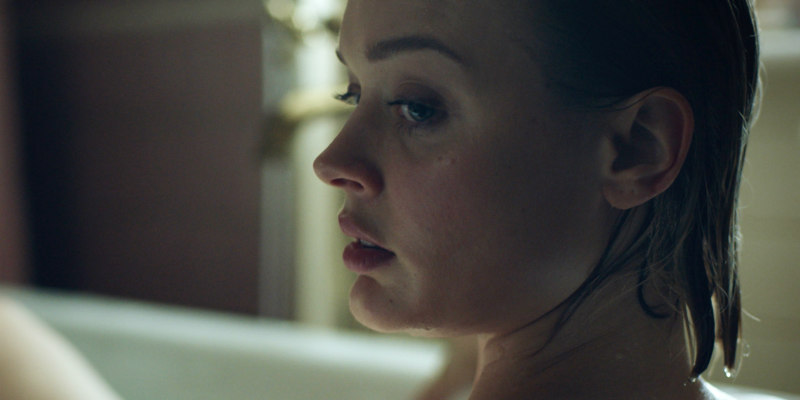
Review by
Eric Hillis
Directed by: Natalie Erika James
Starring: Emily Mortimer, Robyn Nevin, Bella
Heathcote, Chris Bunton, Jeremy Stanford

Some of the most effective films in the horror genre are those that fall
into that loose category of 'Body Snatching'. Be it Don Siegel's
Invasion of the Body Snatchers, Philip Kaufman's equally eerie remake, or William Cameron Menzies'
Invaders from Mars, there's something horrifying and heart-breaking about the idea of a loved
one being replaced by something sinister while continuing to look like the
person we know. For many of us, it's something we'll have to deal with in
real life if our parents live long enough to be seized by senility, dementia
or Alzheimer's, left to watch as the men and women who raised us deteriorate
mentally to the tragic point where they may no longer recognise their own
children. Elsewhere, the sub-genre of 'Body-Horror' employs metaphors for diseases
and conditions that ravage us physically. But physical deterioration is
rarely as disturbing as its mental equivalent. We accept that our bodies are
inevitably going to crumble, but few of us are prepared to lose our
minds.

Australian filmmaker Natalie Erika James' confident directorial debut Relic combines elements of both Body-Horror and Body-Snatching in a way that will get under the skin of anyone with a parent in their twilight years. Her film opens with the allegorical image of an overflowing bath, water cascading down a carpeted staircase and pooling around the bare feet of the elderly Edna (Robyn Nevin). It appears to be the first of several incidents that would signal the onset of some natural mental collapse, save for the shadowy black figure glimpsed in the corner of Edna's living room.
[ READ MORE: New Release Review - The Front Room ]
A few months later Edna's fortysomething daughter Kay (Emily Mortimer) receives a call from the police letting her know that her mother's neighbours have reported her missing for several days. With her own daughter, Sam (Bella Heathcote), in tow, Kay drives to her childhood home in search of her mother. There she finds the house as she knows it, but with subtle differences, like how her mother's favourite armchair has been moved away from the well-worn indentations it made in the carpet over decades, or the new lock on the back door. Edna has littered her house with post-it notes reminding her of her everyday routine, like the tattoos sported by Guy Pearce's short-term amnesiac in Memento. One such note sports the cryptic instruction "Don't follow it!"

The following morning Kay and Sam wake to find Edna making coffee in the kitchen as though nothing out of the ordinary had ever happened. She refuses to explain her disappearance yet seems fully cognitive. But over the following days Edna's personality begins to change, and Kay and Sam slowly come to realise it's due to something more other-worldly than any earthly mental condition.
[ READ MORE: New Release Review - Don't Move ]
Relic's supernatural elements are present only in its bookend sequences. Remove them entirely and it would still function as a horror movie, albeit one grounded in the all too real milieu of the mental decline of an elderly person, and the guilt experienced by their child. Seeing Edna fully alive, listening to old records and reminiscing about the past one minute only to turn on her granddaughter the next is truly upsetting due to how tangible it is, preying on the fear of anyone with a parent of Edna's vintage. In one heart-breaking sequence, Edna gifts Sam with her wedding ring, only to accuse her grandchild of stealing it the following day. Later, Kay finds her mother burying a photo album in the dirt, as though she believes that if she hides her best memories they can't be stolen.

Despite Relic laying its supernatural cards on the table in its opening sequence, James holds back on explicitly revealing what is really happening to Edna until her film's climax, which bears similarities to the conclusion of Jonathan Glazer's Under the Skin, itself a Body-Snatching movie in which we're led to empathise with the body-snatcher herself. We're left to look out for clues, like how the spreading black bruises on Edna's skin mimic the rising damp of her house's walls, or the story a neighbour tells of how Edna locked his teenage son in a closet in her home - was it for the boy's protection or an act of malice?
Mortimer, Nevin and Heathcote are all excellent here, and the fractured
relationship between the women is laid out in a manner as ambiguous as the
nature of Edna's mental state. There are no histrionics, no family
revelations doled out in teary soliloquys. Rather it's what's left unsaid
that tells us about the dynamic shared by these three women. At several
points Mortimer's Kay opens her mouth, on the cusp of speaking to her
mother, only to hold her tongue. Kay feels she has been a bad daughter, but
in classic Anglo-Saxon fashion, she can't find the words to make amends with
Edna. Ultimately Kay expresses her love and compassion for her mother not
through words but through touch, in a closing sequence that reminds us that
horror can be the most humane and healing of genres.

Relic is on Shudder UK/ROI
now.
